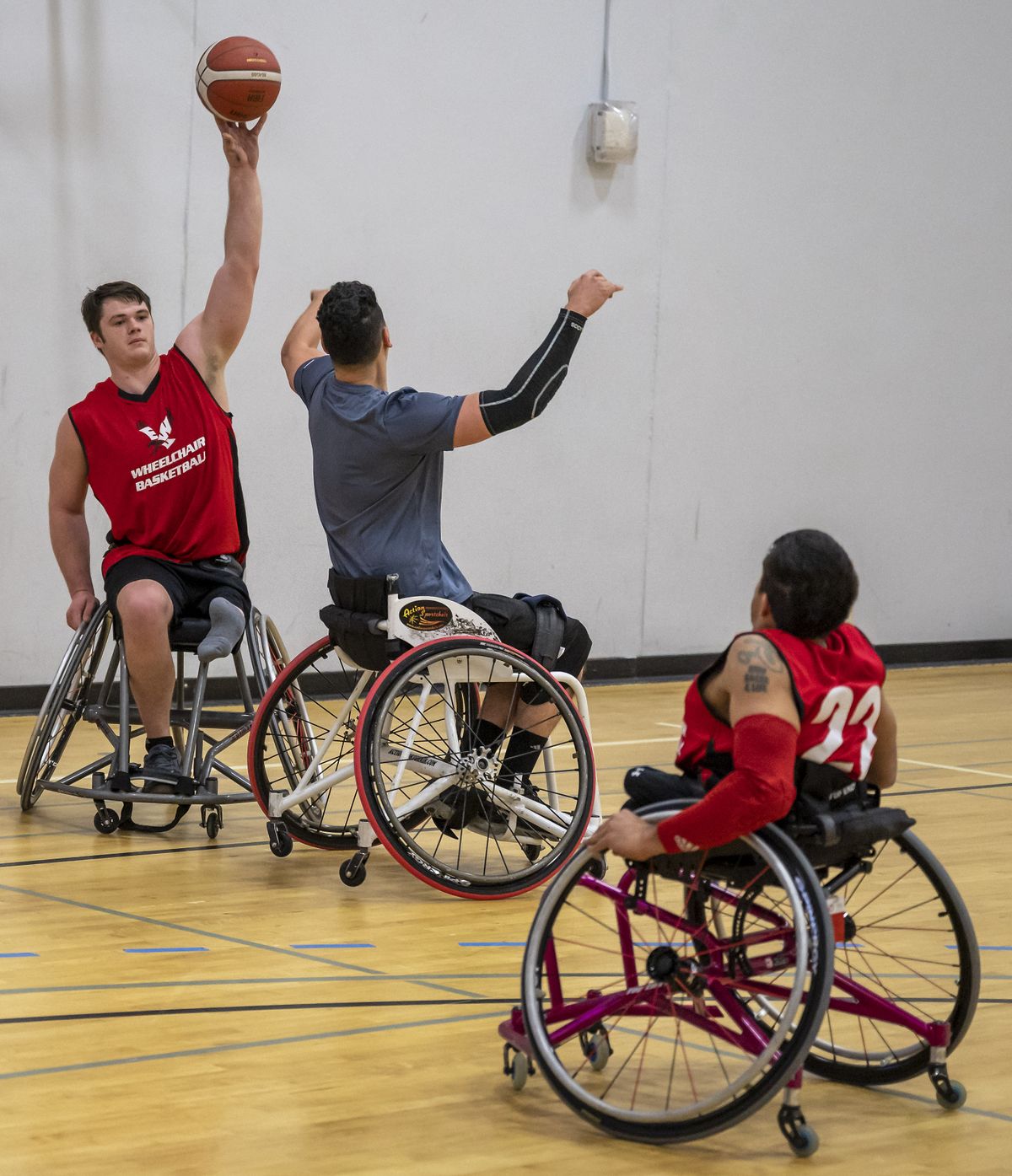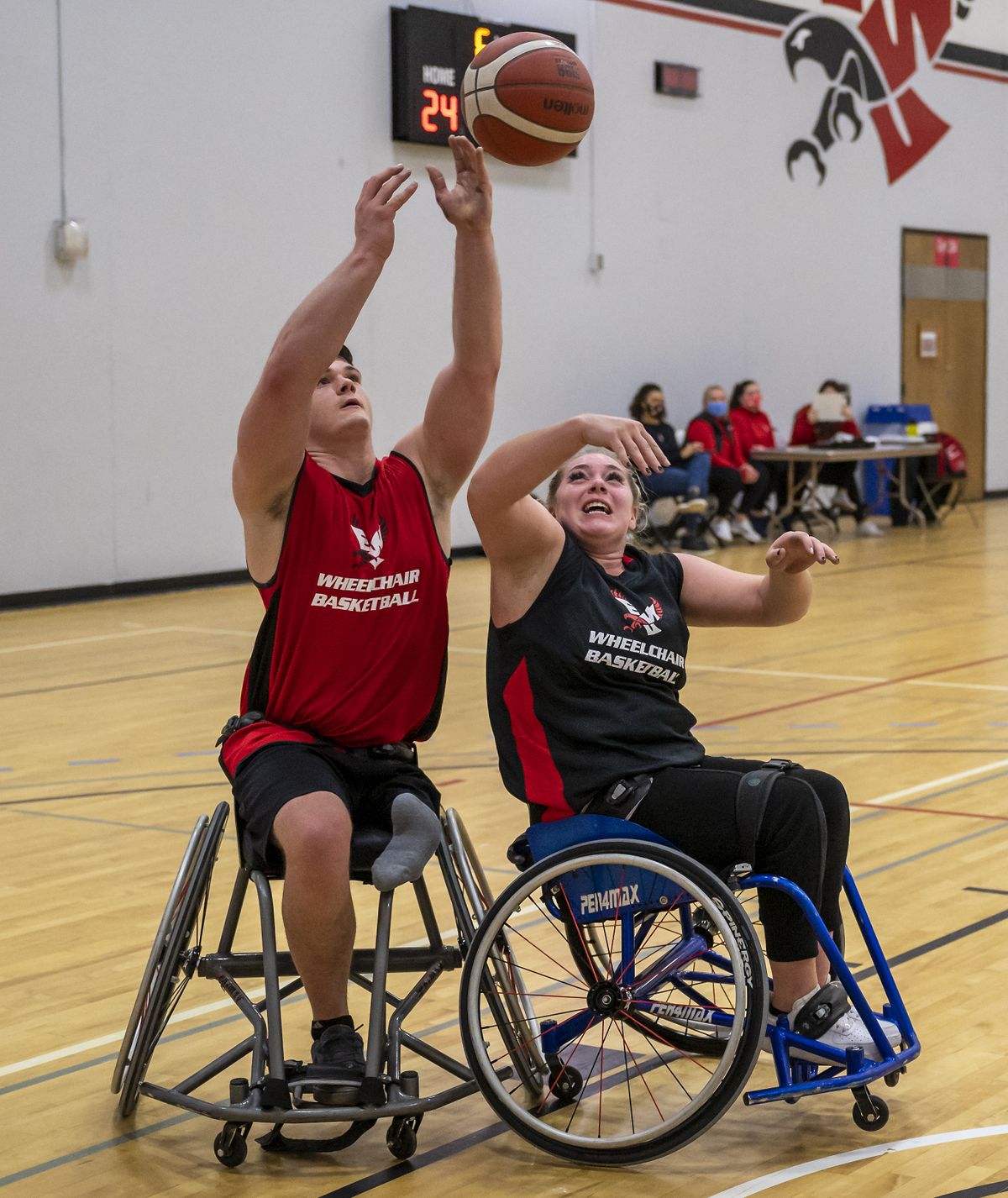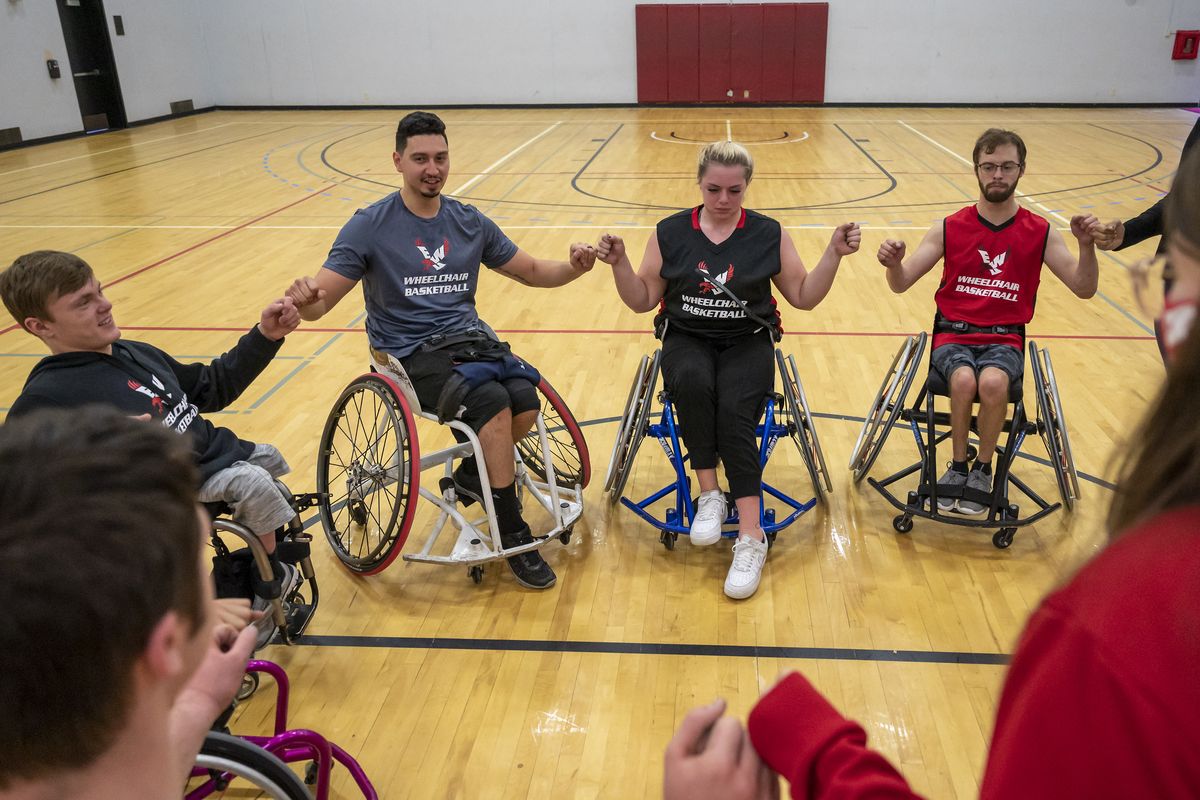Ready for their shot: Eastern Washington, one of 18 colleges to offer varsity wheelchair basketball, tips off in January
Coach David Evjen (in white wheelchair) gathers players together after a scrimmage at Eastern Washington University, Friday, Nov. 20, 2020. The Inland Northwest has had several standout wheelchair athletes – each in a wheelchair for various reasons – but never a collegiate outlet. Now they do with EWU’s school-sponsored wheelchair basketball program. (Colin Mulvany/THE SPOKESMAN-REVIEW)
Before David Evjen understood the nuance of wheelchair basketball, he miscalculated.
Once an able-bodied high school player in Minnesota, a herniated disc and resulting nerve damage took away his senior season before attending Southwest Minnesota State, where he often limped as he navigated the small rural campus.
Evjen figured his playing days were well behind him as he fired jump shots between classes, in view of a wheelchair-bound student who noticed the freshman’s impairment.
“He asked me, ‘Ever consider playing wheelchair basketball?’ ” Evjen said. “I had a limp but wasn’t in a wheelchair, so I asked, ‘Am I allowed to play?’ and ‘Would it even be fair?’ ”
The student, a member of a rare college-affiliated varsity wheelchair basketball program , wasn’t worried.
“He said, ‘Oh, it will be fair. Trust me.’ ” Evjen said. “I went and played, thinking that because I was once an able-bodied player, I would do well against the wheelchair players who were more disabled than me.
“But I was awful. I airballed my first shot by about 5 feet. It’s a different game.”
Eight years later, Evjen, who went on to have a nice college career and play for Colombia’s national team, is the young head coach of Eastern Washington University’s first wheelchair basketball program.
Eighteen colleges in the United States offer varsity wheelchair basketball with the addition of EWU. The program is powered by grant money and part of the EWU College of Health Science and Public Health.
“This is not a club team that plays two days a week just to have fun, then puts the equipment in the storage,” said Evjen, whose team practices five days a week. “We’re lifting, doing study halls and things other collegiate sports do.”
The Eagles will open their season Jan. 14 at a tournament hosted by the University of Nebraska Omaha.
The NCAA doesn’t sanction wheelchair basketball, so teams are members of the National Wheelchair Basketball Association’s Intercollegiate Division.
To be NWBA eligible, students must have a functional disability in a lower extremity that would otherwise not allow the athlete to be medically cleared by the NCAA.
Evjen, who stayed at the Minnesota school as an assistant as he pursued a master’s degree, found a nice pipeline of Spokane-area athletes when he accepted the EWU position in January, leaving his job as a Spanish Cultural Liaison at Willmar (Minnesota) High School
ParaSport Spokane had long produced several skilled wheelchair players, Evjen said, helping ease the recruiting process in his program’s infancy.
Eight players were initially slated to join the first-year team, but the coronavirus pandemic led to three athletes opting out.
Five players comprise the Eagles’ roster, which is thin on depth but relatively heavy in experience.
Moses Lake High School product Spencer Kimbro, who has scoliosis and an amputated leg, played his freshman season at the University of Alabama before returning to the Inland Northwest.
University High graduate Trayton Dwyer, who has cerebral palsy, played at Southwest Minnesota State before returning to the Spokane Valley,
Freshmen Tyler Hinshaw (Post Falls High School), Bob Hunt (Riverside High School) and Sophie Munter (Ferris High School) played competitively in Spokane.
Some can walk. Others can’t.
Dwyer is often on his feet, but his mobility is limited.
“Growing up, it was frustrating,” Dwyer said. “I remember being 13 and looking at the kids my age doing the things that I wanted to do but couldn’t.
“You pick out the people you think you can still beat, but you don’t get a chance to prove yourself like you do here.”
Parasports programs gave Dwyer the outlet to compete, eventually leading him to Minnesota to pursue wheelchair basketball.
With EWU’s new program, Dwyer gets to play near home.
“It’s great,” he said. “You meet more students, expose them to life with a disability. The school notices your interest in the sport.”
Dwyer’s coach agreed.
“For us having a collegiate team, it opens up so many doors,” Evjen said. “We’re the only team within a five-state radius with a college wheelchair team. The University of Arizona is the closest.”
Munter, the lone female on the coed roster, feels more connected to EWU.
“I think it’s a great thing that there’s a wheelchair program now,” Munter said. “It makes me more involved with EWU.”
Munter, who has cerebral palsy, has played basketball nine years, including national tournaments, and was once a Hoopfest wheelchair division champion.
Upper-body strength and cardio are essential, she said, especially on a team with no reserves.
“I love being active, getting to know the game,” Munter said. “It’s an intense sport.”
A 2021 recruiting class is expected to give EWU much-needed depth next season.
“We have one letter of intent signed for next season so far, hoping to sign more,” Evjen said. “Right now, I’m out there scrimmaging with the team.”


